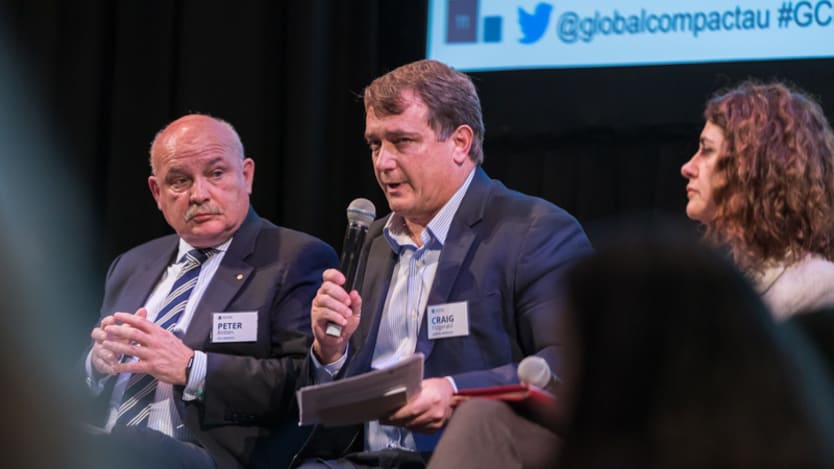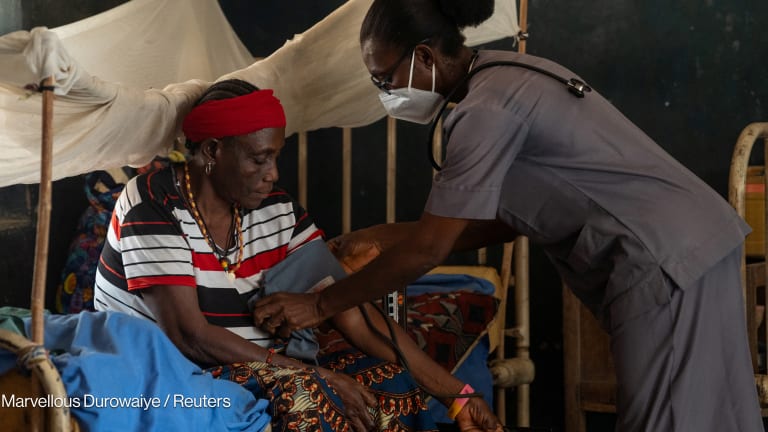
CANBERRA — Australia-based Aspen Medical is the only private company certified as an emergency medical team to support humanitarian responses, with specific classifications for outbreak and man-made conflict. But as a for-profit company working in humanitarian health, it continually faces questions on its role in putting the health care needs of low- and middle-income countries ahead of its business.
“There is great skepticism of where we operate and who we are operating with,” Craig Fitzgerald, executive general manager of Aspen Medical’s international operations explained to Devex.
“We ... aim to fill a niche — we’re not an international NGO, we don’t go everywhere like MSF and ICRC ... Sometimes we are the last resort — like in Mosul, where no one else was able to operate the hospitals.”
— Craig Fitzgerald, executive general manager, international operations, Aspen MedicalThe responsibility that comes with humanitarian crises and the needs of LMICs is not something Aspen Medical takes lightly, Fitzgerald said. As a Certified B Corporation, it adheres to standards for social and environmental responsibility, transparency, legal accountability, as well as balancing profit. But the for-profit model is not something Aspen Medical shies away from either.
“In the Solomon Islands, Iraq, Somalia, Sierra Leone, and Liberia, we went in on government contracts,” he told Devex. “In northwest Africa, we went in to support Ebola under USAID and DFAT contracts. And then we, as a business, did what business is meant to do — we found other opportunities.”
Fitzgerald discussed with Devex the challenges of working as the private member of public-private partnerships, and the opportunities available to Aspen Medical in the challenging landscapes in which it operates.
The conversation has been edited for length and clarity.
The countries in which you operate, including in northwest Africa, Iraq, and the Pacific, are challenging in many ways — politically, geographically, financially as well as health. What was Aspen Medical’s journey to where you are now?
In many of the areas we are operating, we began operations under government contracts — including the Solomon Islands, Iraq, Somalia, Sierra Leone, and Liberia. And we stayed after gaining experience and comfort in the operating environments and built a reputation through our delivery.
In northwest Africa, we weren’t going to continue delivering Ebola treatment units in Liberia. But we saw opportunities and built primary health care facilities. In this region, we also went to South Sudan, Somalia, and now we are in Libya — which perhaps has not turned out to be the best business choice.
In Iraq, we also stayed after government contracts because, again, we got to understand the environment.
In the Solomons, we went in with the Regional Assistance Mission to Solomon Islands [RAMSI] and ran the hospital. We were there for 12 years and got to understand things.
But we don’t always stay.
Our PPP in Mosul, where we work with the World Health Organization and the UNFPA and Iraqi ministry of health is interesting. The partnership was to operate four trauma centers and two birthing centers in Mosul. In the sense of a PPP, the reason it was unique is that we were only 50% of the staffing — the Iraqi ministry of health was the other 50%. And then we handed the facilities over — we were out. This isn’t a long-term thing — the Iraqi ministry of health is quite capable and [has] outstanding clinicians.
Initially, working in countries as a partnership provides a bit of security — it’s not a “build it and they will come” scenario. It’s ironic when you look at two areas we have failed — South Texas and Canada: We went in cold. The U.S. was a problem because of its health system and we struggled to navigate Medicare, Medicaid, and Obama Care and the remuneration of funds.
It’s not like it’s all wins. Sometimes governments want to abdicate the risk — so it’s about finding where there is true sharing of risk. There will be risks, undoubtedly, but there should be true sharing of it in a partnership.
You have recently been awarded a contract to manage hospitals in Fiji — can you discuss the role of Aspen Medical there?
Fiji is a big one — a lot of people talk about unlocking a capital in super [superannuation] funds, and Fiji has done it because our partner is the National Provident Fund. It’s a very heavy responsibility but they have unlocked their super to improve the health of Fijians. It’s not free money — there still needs to be a return on investment — but it’s amazing to think that of all places, this is happening in Fiji.
They did it with the help of the World Bank and the IFC [International Finance Corporation], so it is quite an innovative model, and a lot of people are going to be interested to see if it can be scaled out across the Pacific.
It’s a 23-year deal, and the chair of the National Provident Fund said to us that they are funding the well all Fijians are going to drink from — and that’s a heavy responsibility on us.
It’s going to take a while and there will be challenges, but in five or six years, we’ll be able to assess its impacts.
In being a private sector health provider in the humanitarian and development space, what pressure is on you to act responsibly and prove that?
It’s very important for us to be a good corporate citizen. In the countries where we operate, we register, pay our taxes, and don’t give any reason to think we’re not being a good business — you can’t play that game. Some of our revenue is through humanitarian responses. If we get caught somewhere in the world not paying tax, our brand will be ruined — especially considering we are a B-Corp.
I don’t know if international NGOs appreciate that it would have the same impact on us as the Haiti scandal did for Oxfam. I’m not criticizing Oxfam but using this as an example of how a scandal can impact the brand. If we were discovered evading taxes in Iraq for example, DFAT [Department of Foreign Affairs and Trade], DFID [Department for International Development] and USAID [United States Agency for International Development] would not touch us. Do we want to risk that? No.
But we also aim to fill a niche — we’re not an international NGO, we don’t go everywhere like MSF [Médecins Sans Frontières] and ICRC [International Committee of the Red Cross] and we don’t do children’s programs or nutrition. Sometimes we are the last resort — like in Mosul, where no one else was able to operate the hospitals.
Business will invest if there is an opportunity, but we agree it needs to act ethically and this should be monitored. Our B-Corp Certification forces us to adhere to human rights.
We were recertified last year and out of the certification process, B-Corp discovered that at our middle management level the gender breakdown was fine but we had a gender pay gap — unbeknownst to us. The audit brought this to our attention and we amended that. These are important checks.
In the countries, when we go in on a humanitarian situation, our next level is to partner with a for-purpose company.
In explaining why Aspen Medical delivers health care services in challenging environments, what is your answer?
Health care is a public good. But how do you deliver better health care and try to make money to be sustainable? And how do you do that in a developing country?
We’re there because there is a need, and we honestly think we can make a difference. You have to have purpose — otherwise, why do it at all?
Search for articles
Most Read
- 1
- 2
- 3
- 4
- 5








